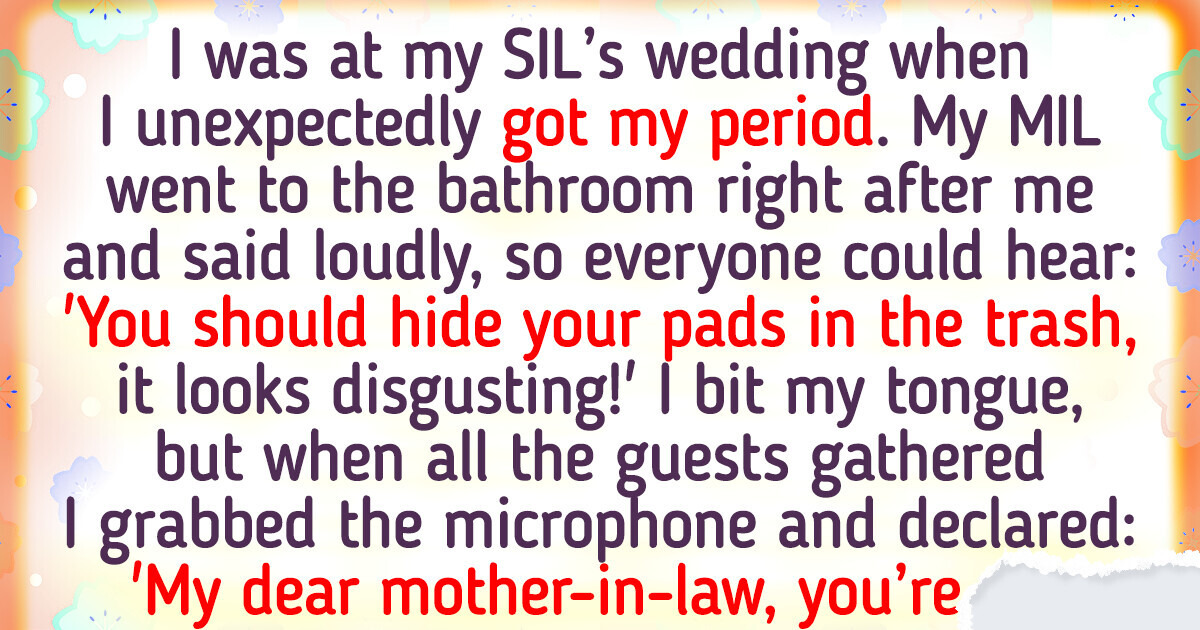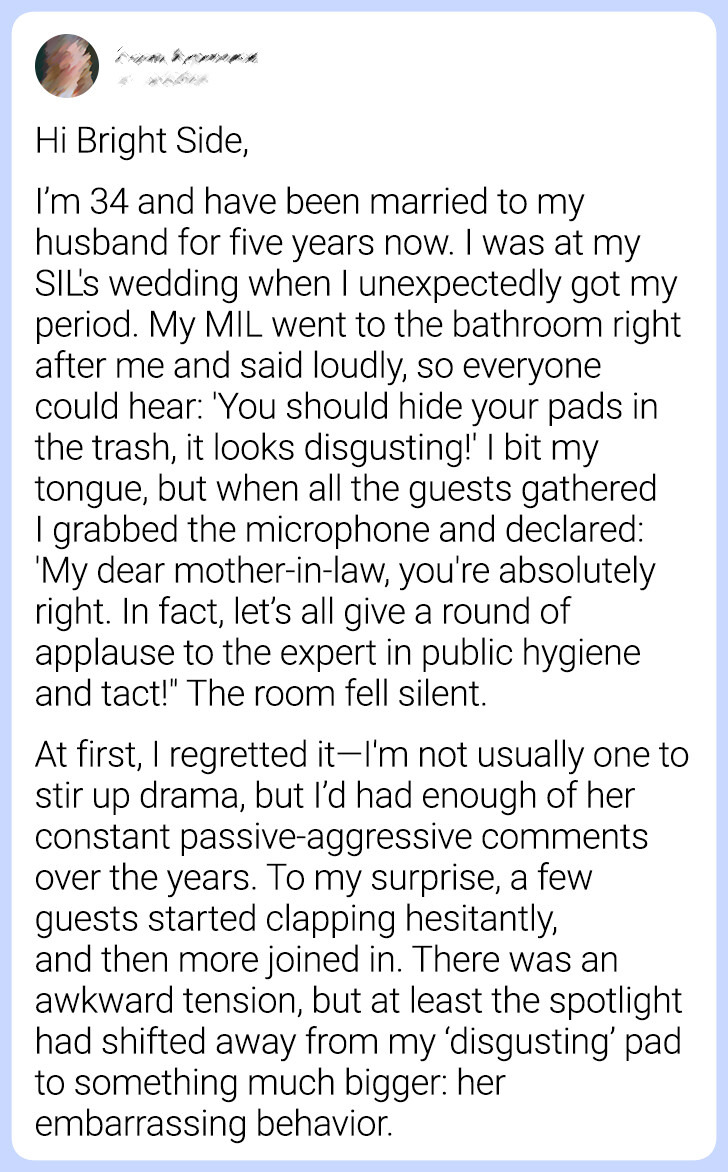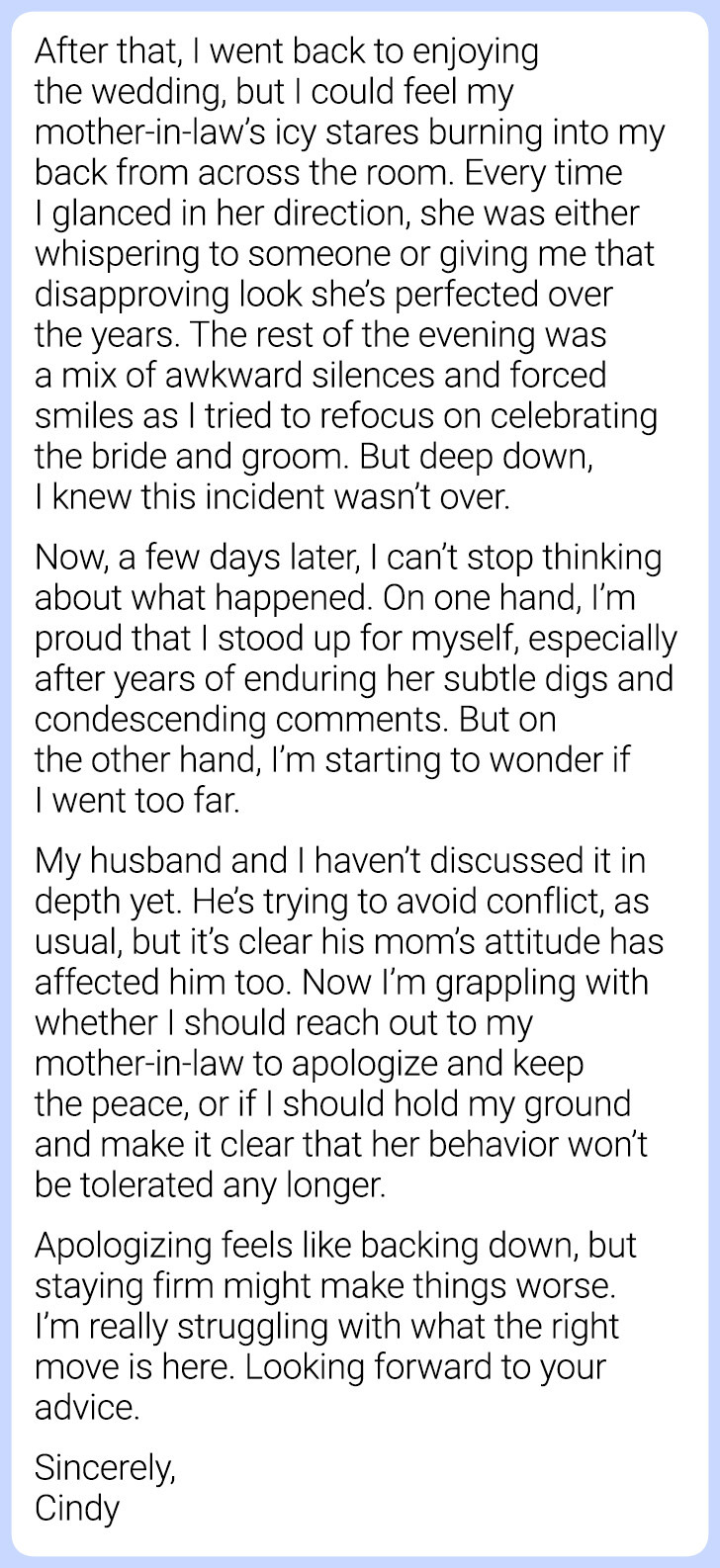Don't give in to her
My MIL Embarrassed Me in Public, and I Got My Payback

Being humiliated in public is a nightmare for most of us. And if your mother-in-law is the one responsible for your embarrassment, the situation can become even more complicated. Would you seek revenge, or would you choose to remain silent to keep the peace in the family? One of our readers reached out to us with her story about standing her ground, but now she’s unsure whether she made the right choice.


Thank you, Cindy, for sharing your story with us. The situation is indeed complicated, and navigating relationships with your in-laws can be stressful. We hope that the advice we've gathered for you will help you maintain a good relationship with your mother-in-law while standing your ground.
Talk to your husband first.
Reflect on your emotions.
After any emotional conflict, it’s important to step back and give yourself the space to truly understand what you're feeling. Perhaps you felt embarrassed, knowing that others overheard a private matter being called out publicly. Or maybe you were frustrated because this isn't the first time she’s made a snide remark in front of others.
Take the time to reflect on what emotions you were experiencing in the moment. Understanding this can also help guide your next steps.
Consider the context.
It’s no secret that weddings can bring out heightened emotions in everyone involved. The day is usually filled with anticipation, expectations, and sometimes, underlying family tensions.
Take into account the stressful nature of the day for both you and your mother-in-law. Reflecting on how the charged atmosphere of the wedding may have impacted both your reactions can help put the situation in perspective. It’s possible that both of you were responding to the stress of the day, rather than acting purely out of malice or hurt feelings.
Decide if an apology is necessary.
Apologizing can be a powerful tool in conflict resolution, but it doesn’t have to mean that you’re taking full responsibility or admitting that your actions were completely wrong. Instead, think of it as a way to acknowledge the fact that the situation got out of hand and express a willingness to move forward.
If you feel that offering an apology would help ease some of the tension, you can say something along the lines of, "I’m sorry for how things escalated at the wedding. I was caught off guard, and your comment really hurt me." This kind of apology allows you to take responsibility for your reaction while still expressing how her behavior affected you.
Prioritize your well-being.
At the end of the day, prioritize your own mental and emotional health. If your mother-in-law’s behavior continues to affect you negatively, it’s okay to create distance or minimize interactions for your peace of mind, even if that means keeping the relationship polite but distant.
Whose side would you rather take, the author's or her mother-in-law's? Do you have any stories to share about times when you needed advice on how to behave with your in-laws?
Carla was grateful for her mother-in-law’s help in buying their home, but she had never imagined living with her. So, when her husband told her that his mother would be moving in, she felt she couldn’t say no right away. Instead, Carla chose to set some clear boundaries and outlined a few important rules for her mother-in-law to follow before moving in. She never expected this decision to lead to a family conflict.
Comments
Related Reads
I Refuse to Go Back to Work to Help My Husband Pay My Stepdaughter’s Tuition

My Brother Excluded My Son Out of His Child-Free Wedding but Invited His Little Cousins

10 Family Secrets That Could Tear a Novelist’s Heart Out

I Was Shamed for Being a Mom at Work—So I Planned My Revenge

I Refused to Share My $400K Lottery Winnings With My Family

I Kicked My Stepdaughter Out — Her Behavior Was Turning Creepy

19 Tweets That Can Make Even the Most Cold-Hearted People Shed a Tear

12 Stories That Capture the Sweet and Sour Memories of Blended Families

My Boss Publicly Shamed My Small Charity Donation—So I Revealed Exactly How Much He Gave

14 Stories From Cleaners That Are Wilder Than Any Movie Script

I Refused to Pay for Our Valentine’s Dinner—Then I Learned the Heartbreaking Truth

I Refused to Talk to My Parents After They Chose My Ex-Wife Over Me





